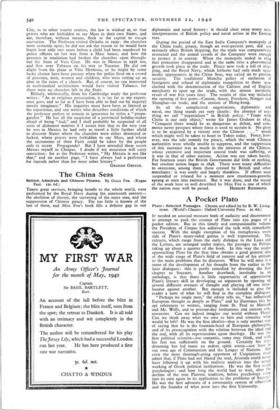The China Seas
British Admirals and Chinese Pirates. By Grace Fox. (Kegan Paul. 125. 6d.) THREE great services, bringing benefit to the whole word, were performed by the Royal Navy during the nineteenth century— the abolition of slavery, the surveying of the outer seas, and the suppression of Chinese piracy. Far too little is known of the last of these, and Miss Fox's book fills a definite gap in our diplomatic and naval history: it should clear away many mis- interpretations of British policy and naval action in the Eastern seas.
During the period of the East India Company's monopoly of the China trade, piracy, though an ever-present pest, did not seriously affect British shipping, for the trade was comparatively restricted and the armed vessels of the Company were enough to protect it in convoy. When the monopoly ended in 1834 that protection disappeared and at the sat& time a pheromenal growth took place in the trade. Piracy now took a toll of ship- ping, and the Royal Navy, which hitherto had only made spas- modic appearances in the China Seas, was called on to provide security. The traditional Manchu policy of exclusion of foreigners and refusal of diplomatic recognition to them now clashed with the determination of the Cabinet and of English merchants to open up the trade, with the almost inevitable result of war five years later. The results of that war included the opening of five ports—Canton, Amoy, Foochow, Ningpo and Shanghai—to trade, and the cession of Hong-kong.
In all the complicated negotiations, diplomatic and naval, one thing stands out very clearly: the absence of any- thing we call " imperialism " in British policy. "Trade with China is our only object," wrote Sir James Graham in 1832. "Conquest there would be as dangerous as defeat, and com- merce never prospers where force is used to sustain it. No glory is to be acquired by a victory over the Chinese . . " words which might well be taken to heart in Tokyo today. Force, how- ever, was the sole remedy for piracy, which the weak Chinese authorities were wholly unable to suppress, and the suppression of this nuisance was as much in the interests of the Chinese, whose extensive and important coastal trade was suffering, as it was in that of other nations. Action was not taken hastily. For fourteen years the British Government did little or nothing, but resolute action began in INS. There were many difficulties to overcome, among them those created by British and other merchants : it was costly and largely thankless. If efforts were suspended or relaxed for a moment new mushroom-growths sprang at once into existence. But it was done, and the record of the work here so well described by Miss Fox is one of which
the nation may well be proud. HERBERT RICHMOND.


























































 Previous page
Previous page